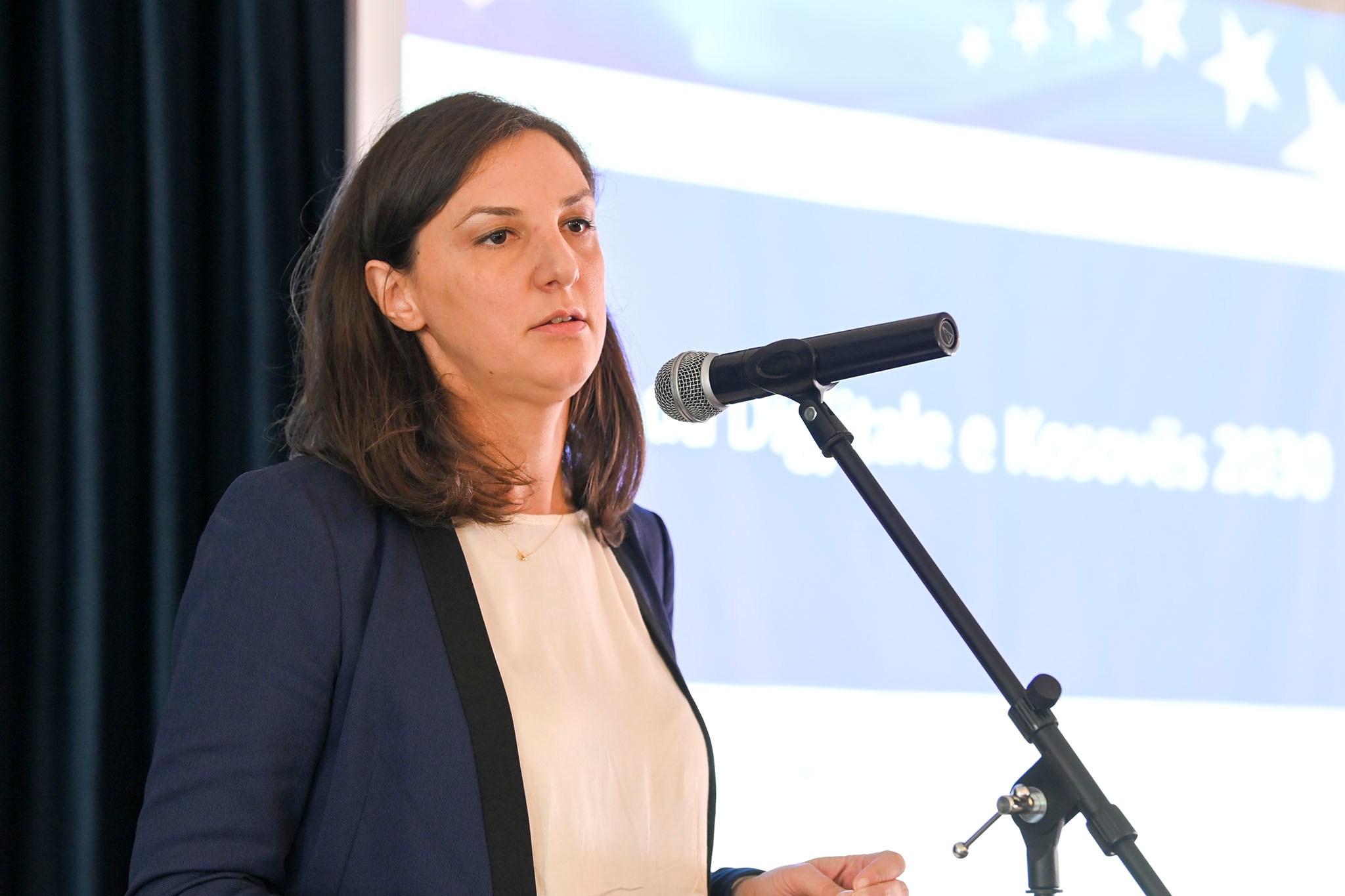Public Consultations Held on the Kosovo Digital Agenda 2030
Prishtina, 13 June 2023 – Before a gathering of numerous Information and Communication Technology (ICT) professionals, the Minister of Economy (ME), Artane Rizvanolli, together with representatives of the Ministry of Economy, presented the Kosovo Digital Agenda 2030.
The Kosovo Digital Agenda 2030 is a cross-sectoral government strategy that sets out the policy and specific priorities of Kosovo in the context of ongoing digital transformation of the economy and society, influenced by innovative technologies and global digital trends.
The event began with speeches from the Minister of Economy, Artane Rizvanolli, and the Director of the Department of Post-Telecommunications, Information and Communication Technology (DPTICT), Agim Kukaj.
In her speech, Minister Rizvanolli presented the vision of the Digital Agenda, emphasizing that Kosovo aims to become a modern country in the digital world by 2030, with an advanced digital economy in the entire region, where citizens can use Information Technology and electronic services regardless of their background, ethnic origin, or place of residence in Kosovo. She stated that, just as the world of technology and digitalization is flexible, the Digital Agenda should also be fluid and adaptable to the needs of the moment, the market, and the citizens. Therefore, the Agenda is designed to align with both general and specific objectives during its implementation. Your contribution as professionals is therefore of great importance to ensure that its realization serves the overall and specific objectives of the sector.
The utilization of Information and Communication Technology (ICT) in administrative, taxation, and business processes will help reduce operational costs, increase efficiency and productivity, enabling both public and private companies to redirect resources to other areas of investment.
Minister Rizvanolli briefly outlined the objectives of the Digital Agenda, stating that five strategic objectives have been defined. The first objective is to strengthen the cybersecurity ecosystem, which is now essential for the secure and reliable functioning of digital infrastructure and services. This is being addressed for the first time in Kosovo with such priority, even though the Agenda is still in the process of development. However, this objective is reflected in ongoing projects and processes, including the investments of Kosovo Telecom, which plans to invest 1 million euros in cybersecurity for the first time. Additionally, the establishment of a Computer Emergency Response Team (CERT) for energy, as envisaged in the Energy Strategy 2022-2031, is also part of this objective.
The second objective of the Digital Agenda focuses on advanced and secure digital infrastructure for fixed and mobile ICT services, aiming at the development of smart tools and services for smart business verticals, smart communications, and public safety. The digital enrichment of businesses is one of the aspects that requires significant effort, and we aim to achieve digital inclusion across the entire economic sector, especially among small and medium enterprises, added Rizvanolli.
The third objective aims at the digitalization of public services in all segments of online public services, which should be accessible to all, including persons with disabilities. Minister Rizvanolli expressed her satisfaction with the implementation of many activities and policies by the Government, highlighting the subsidy scheme for heating equipment as an example, where the entire process has been managed electronically, reliably, and transparently.
The final objective is “Citizens with Digital Skills and an Research and Development Innovative Ecosystem”, which envisions the transformation of the education system for the digital era. Various projects and initiatives, such as the Kosovo Research and Development Network (KREN), which has now connected all higher education institutions, both public and private, are part of this objective. The goal is to establish connections with primary and secondary schools in the future, while also involving businesses, startups, research institutes, and all organizations that need to use the KREN.
Director of DPTICT, Agim Kukaj, presented in detail the objectives of the Kosovo Digital Agenda 2030, emphasizing, among other, that the planned activities should continue diligently towards the year 2030 as the final destination, as well as the implementation of the previous agenda.
During the meeting, representatives from the field of Information and Communication Technology (ICT) presented their ideas and comments, to which Minister Rizvanolli and Director Kukaj responded and engaged in a discussion with the attendees, aiming to make the document of the Kosovo Digital Agenda 2030 as effective and useful as possible, especially for the ICT sector and public and private institutions.
The following participants attended this event: Minister of Economy, Artane Rizvanolli, Director of DPTICT, Agim Kukaj, Political Advisor to the Prime Minister, Lulzon Jagxhiu, as well as representatives from Telekom Kosovo, GLPS, Zeta Corps L.L.C., UNDP, STIKK, CACTUS/RECURA, Wasabi Tech, StarLab, Ericsson, Telkos, ODK, ICK, SHPIK, IpkoFoundation, PSWD/USAID, 3CIS, NGN, TIVE, Audiosolution, Nasabi Technologies, APPDEC, and Kosova Net.

